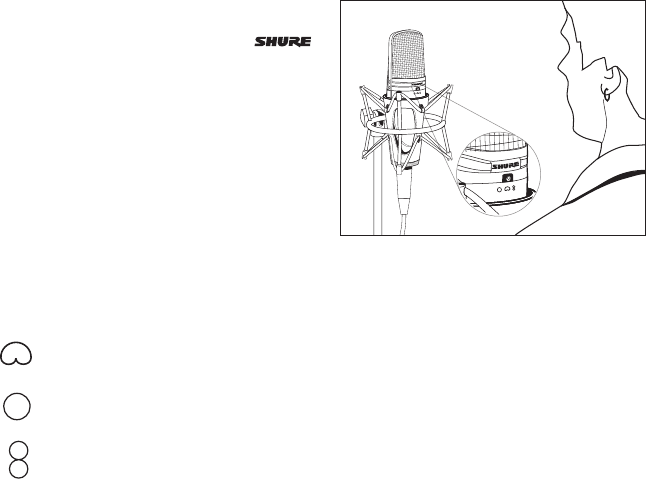
6
Suspension Mount
Use the supplied ShureLock
®
suspension mount to secure the microphone to a floor or boom stand.
Important: Thread the knurled locking ring securely to the base of the microphone. Do not overtighten.
Operation
Power Requirements
This microphone requires phantom power and performs best with a 48 Vdc supply (IEC 61938).
However, it will operate with slightly decreased headroom and sensitivity with supplies as low as 11
Vdc.
Most modern mixers provide phantom power. You must use a balanced microphone cable: XLR-to-
XLR or XLR-to-TRS.
Positioning
Position the front of the microphone, with ,
towards the desired sound source.
Selecting a Polar Pattern
The three position switch on the front of the microphone sets the polar response pattern. This
changes the microphone’s sensitivity to sounds coming from different angles.
Cardioid. Picks up sounds directly in front of the microphone and is least sensitive to those in
back. This is most commonly used in studio recording and live-sound applications.
Omnidirectional. Picks up sounds from all directions. Best for picking up room ambience and
for miking several sources simultaneously, such as an ensemble or multiple singers. The om-
nidirectional polar pattern exhibits no proximity effect.
Bidirectional. Picks up equally from the front and back of the microphone while reject-
ing sounds from the sides. Often used for stereo recording (such as mid-side and Blumlein
techniques).
Note: As with all bidirectional microphones, sounds picked up from the back will be out of polarity
with the source. Those from the front are in polarity with the source.
CAUTION: The switch produces mechanical noise which, when amplified, may damage the loud-
speakers. Turn down any loudspeakers or mute the microphone at the mixing console before using
the switch.












